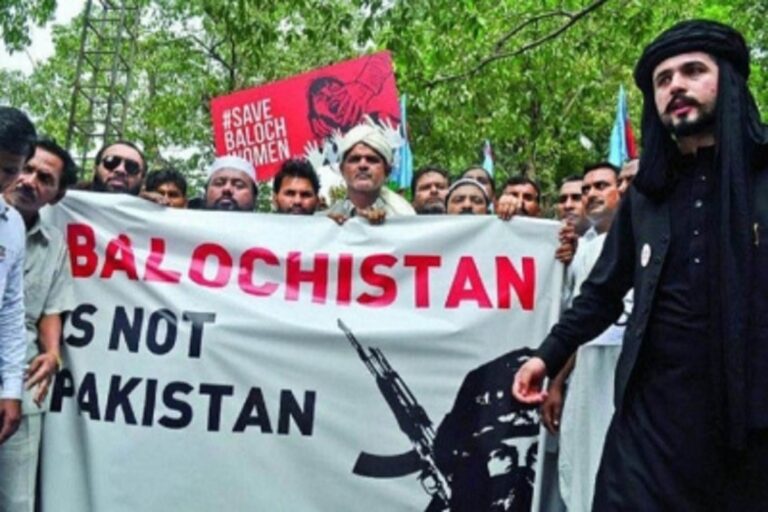
In the season of electoral politics that is slowly engulfing Pakistan, Islamabad is witnessing a different kind of activity — a protest march led by Baloch women who have travelled over 2,000 km from Turbat on the Makran coast in Balochistan to make themselves heard. The march, under the banner of the Baloch Yakjehti Council (BYC) and led by the fearless and determined Dr Mahrang Baloch, is a protest against enforced disappearances and extrajudicial killings that are rampant in the province. It is a poignant cry to draw attention to their plight, and a desperate hope that their missing relatives are still alive.
The protest started in Turbat on December 6 after the extra-judicial killing of a Baloch youth by the security forces. Following a two-week protest, the sit-in was relocated to Quetta. Getting no satisfaction there, the protesters decided to march to Islamabad. Here they were initially refused entry and subjected to tear gas, water cannons, beatings, intimidation and arrests instead of being allowed to go to a peaceful protest camp at the National Press Club. At one stage, the authorities even planned to ‘deport’ the protesters, portrayed as terrorist sympathisers, back to Quetta. This was, however, prevented by the courts which told the authorities not to forcibly evict them.
So what makes this one different from the similar marches in the past, one of which in 2014 was led by Baloch activist 70-plus Mama Qadeer? For one thing, this march has had a greater resonance in Balochistan with massive crowds greeting the marchers in several towns through which they passed. Solidarity protests and marches have also been carried out in different parts of Balochistan, and even in Karachi. For another, the march also gained considerable traction in south Punjab, especially Dera Ghazi Khan and Taunsa Shareef where many Baloch live. It also resonated with the Pashtuns. In Dera Ismail Khan, parents of the incarcerated Manzoor Pashteen, leader of the Pashtun Tahafuz Movement (PTM), welcomed them and presented a Mazari cap and shawl to Dr Mahrang Baloch. Unity of the Baloch and Pashtuns would be a nightmare scenario for the Pakistan state.
Above all, the march has caught the imagination of the international community due to the leadership and participation of a large number of women of all ages. They have broken the traditional shackles of a conservative society to seek justice against state repression, abductions and extra-judicial killings of their fathers, brothers and sons.
The tribal sardars, who are the visible face of Balochistan in Islamabad and Quetta and often seen rubbing shoulders with the political elite of other provinces in parliament, are conspicuous by their absence in the protests. Mainstream political leaders of Pakistan such as Maryam Nawaz Sharif, who had at one time put on a Baloch dress and hugged a Baloch girl whose father was missing, and Bilawal Bhutto have been absent too. Even the nationalist parties of Balochistan have stayed away.
Despite this, the Baloch protests are gradually gathering international attention. British Labour MP John McDonnell tabled an early day motion in parliament calling for the support of women leading the march. Climate activist Greta Thunberg also voiced solidarity.
European Union ambassador to Pakistan Riina Kionka expressed “deep” concerns over reports of mishandling of Baloch protesters in Islamabad. Mohammed Hanif, the celebrated British-Pakistani author of the best-selling ‘A Crate of Exploding Mangoes’, returned Sitara-i-Imtiaz, the third highest civil award in Pakistan, as a protest against a state that “continues to abduct and torture Baloch citizens”.
The frustration of the protestors was perhaps best articulated by Sammi Deen Baloch, another leader of the march who was quoted in Dawn saying: ‘Each time I come to Islamabad, my sorrows seem to intensify…I feel increasingly isolated and abandoned — as if I am an alien, a terrorist, or an immigrant in my own country.’
What Pakistani rulers don’t seem to realise is that there are still some Balochistan youth who believe their problems can be resolved politically by Islamabad. Given the negative attitude, the ordinary Baloch are being pushed to the wall and they see no future when even raising their voices is unacceptable to the state. How long will it be before disappointment and despair turns into hostility?
A comparison with the situation in the then East Pakistan is inescapable. It was the oppression and exploitation of Bengalis that increased their alienation and resulted in the eventual creation of Bangladesh. Like the Bengalis, the Baloch today are marginalized politically and shoved to the fringes in the imagination and policies of the ruling Punjabi elite. They are as much second-class citizens in the Punjabi-dominated system as were the Bengalis. Pakistan has clearly not learnt lessons from 1971.
Tilak Devasher is the author of ‘Pakistan: The Balochistan Conundrum’ and member, National Security Advisory Board. Views are personal.